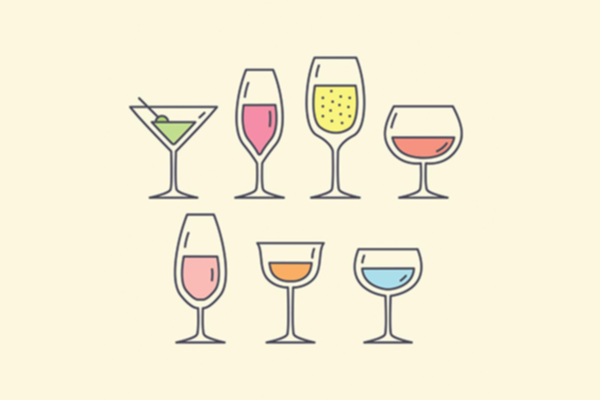The Link Between Alcohol & Cancer
By Wendy Kaplan, MS, RDN, CSO, CDCES, CDN
Is there a link between alcohol and cancer?
The majority of people don’t know this, but there is. Alcohol was first deemed a carcinogen in 1988 by IARC (International Agency for Research on Cancer), which is part of WHO, World Health Organization. Alcohol increases the risk for breast, esophageal, liver, colorectal, stomach, and oral cancers (mouth/pharynx/larynx). These are the six cancers for which there is evidence-based research, but that does not mean that alcohol doesn't affect other cancers.
In 2017, ASCO (American Society of Clinical Oncology) acknowledged alcohol as a carcinogen for the first time, which was a huge step in bringing awareness of alcohol as a carcinogen to the general public, oncologists, and other medical professionals. In this report, ASCO also acknowledged the harmful impact alcohol could have on patients battling cancer.
When alcohol breaks down in the body, acetaldehyde, a carcinogen, is produced. Acetaldehyde breaks and damages DNA (within blood stem cells), leading to chromosome rearrangement and alteration of DNA sequence.
Research surrounding the exact mechanism (or mechanisms) of how alcohol can induce cancer malignancies is ongoing. In theory, it causes chronic inflammation and increases levels of estrogen, which may help cancer cells grow.
What are the current recommendations?
To lower cancer risk, the American Institute for Cancer Research (AICR) recommends not to drink alcohol, which is quite a powerful recommendation for abstinence. However, that’s because alcohol and cancer risk starts at low amounts of alcohol for some cancers such as breast, colorectal and oral cancers (mouth, larynx, pharynx). Therefore, the AICR and other authoritative bodies agree, if you are going to drink, limit it to one standard drink a day for women and two standard drinks a day for men.
One standard drink provides 14 grams of pure alcohol (ethanol). So one drink is equivalent to 12 fl oz. of regular beer (5% alcohol), 5 fl oz. of table wine (12% alcohol), 8-9 fl oz. of malt liquor, and 1.5 fl oz. of 80-proof spirits (that’s your hard liquor - whiskey, gin, rum, vodka, tequila).
It is imperative to be aware that not all drinks are equivalent and poured equally. Even though there are standard portions, precise measurements aren’t always available, and some “pours” are more generous than others. And if beer is your drink of choice, craft beers usually contain more alcohol than regular. So, in a nutshell, we could be drinking much more alcohol than we think. Consuming even moderate amounts of alcohol can raise the risk of breast cancer.
“Isn’t red wine supposed to be good for your heart?”
Red wine has been touted in news headlines because it may have protective effects on coronary heart disease. There is “some” truth to that research. Red wine contains the phytochemical resveratrol, which has been shown in studies to be an inducer of multiple cell-death pathways (such as apoptosis, mitotic catastrophe). The positive information in these studies is what tends to get cherry-picked for the news stories. The reality is, drinking too much alcohol (of any kind) can raise blood triglycerides levels and negatively affect other cardiovascular issues and increase the risk for some cancers. And for the record, you can also find the cancer-fighting phytochemical resveratrol in healthy foods, such as peanuts, grapes, and some berries!
The following statement is the Current Position of The American Heart Association: “How alcohol or wine affects cardiovascular risk merits further research, but right now, the American Heart Association does not recommend drinking wine or any other form of alcohol to gain these potential benefits.”
If you drink alcohol, are you destined to get cancer? No, some people smoke and never get cancer. Sometimes it’s the luck of the draw. Our bodies have natural protective mechanisms to fix and repair the damage. For some, this system works well.
It’s important to note recommendations also apply to prevent cancer recurrence. Research (as would be expected) on “survivors” also shows a correlation with people who had the highest alcohol intake to 17% increased recurrence and 8% all-cause mortality compared with people with the lowest intake.
There are always healthy steps to take in making positive lifestyle changes. Patients can choose better beverages and opt for water, seltzer, tea, and coffee. To spruce things up, try mocktails with water, seltzer, or green tea. Adding different fruit, veggies, and fresh herbs makes drinking and hydrating so much more exciting and enhances the flavor. Doing my own “observational studies,” I can assure you that it makes people drink more and improve overall hydration!
References:
https://www.asco.org/advocacy-policy/asco-in-action/national-survey-reveals-most-americans-are-unaware-key-cancer-risk?et_cid=39746367&et_rid=1844891989&linkid=National+Cancer+Opinion+Survey http://blog.aicr.org/2017/11/10/major-oncology-group-underscores-aicr-research-linking-alcohol-and-cancer-risks/ https://www.sciencedaily.com/releases/2018/01/180103132629.htm https://www.sciencenews.org/article/heavy-drinkers-get-extra-brain-fuel-alcohol http://blog.aicr.org/2019/02/11/mixed-messaging-on-red-wine-separating-myth-from-fact/ https://www.heart.org/en/healthy-living/healthy-eating/eat-smart/nutrition-basics/alcohol-and-heart-health http://blog.aicr.org/2017/07/28/alcohol-and-diabetes-study-how-that-connects-to-cancer-risk/ https://www.rethinkingdrinking.niaaa.nih.gov/How-much-is-too-much/What-counts-as-a-drink/Whats-A-Standard-Drink


